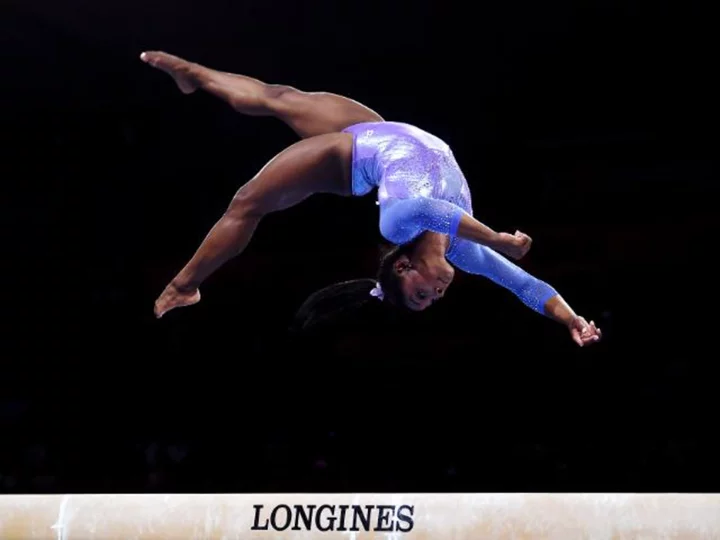Superstar gymnast Simone Biles returns to competition at the US Classic this weekend for the first time since an attack of "the twisties" forced her to drop out of several events at the Tokyo Olympics in July 2021.
She kept her plans quiet until a few weeks ago and says she's now able to twist fine. Scores from an untelevised national training camp indicate she could be back to her record-shattering best -- able to complete the Yurchenko double-pike vault, which no other woman has ever done.
On top of all that, there's another reason to be excited: Biles's return is one more piece of evidence that gymnastics' old culture -- which at times infantilized athletes in cruel and bizarre ways -- is possibly dead.
At 26, you might hear commentators call Biles "old" for her sport. It has been widely reported that female gymnasts have traditionally been teenagers with short careers. But you hear less about why.
"To do gymnastics, you have to have good strength-to-weight ratio," said Jessica O'Beirne, host of the long-running GymCastic podcast. "The emphasis now is on strength and power -- more specifically power. You can't do the gymnastics required if you don't have power."
In the bad old days, the emphasis was on weight. Coaches pressured athletes to eat less so they weighed less, and thin often meant prepubescent. That a tiny childlike body was the ideal is best documented in the TV commentary of old competitions -- clips of the worst examples are now passed around by gymnastics fans with a perverse glee.
"She would prove Bela Karolyi's theory that to wait until after puberty was to waste the best of their years," one sports documentary said of Nadia Comaneci and her coach.
Comaneci captivated the world when she scored a perfect 10 at the 1976 Olympics at the age of 14. At the 1980 games, when she was taller and had the body of a young woman, not a girl, the world worried she had outgrown the sport.
A commentator said of Svetlana Boginskaya in 1991: "She had gained some weight going into the European championships. She still had managed to win the competition, however -- which shows you just how strong she is. And she's back here in top form, looking even skinnier than she was before."
In 1994, an on-air analyst offered an awkward defense of reigning Olympic beam champion, Tatiana Lysenko. "Many viewers will probably look and say, 'Oooh she's a hefty girl!' but no no, she's a very, very shapely young lady. It's really difficult to judge the size of these gymnasts on television."
The pressure to stay thin is abusive and unhealthy, but also, in the long run, it doesn't work. It puts athletes at risk for the female athlete triad, meaning they don't get their period (or get it irregularly), have lower energy and decreased bone density. That can lead to stress fractures and other serious injuries.
1986 national champion Jennifer Sey has described living on a diet of apples and lettuce -- and a coach that screamed, "I don't coach fat gymnasts!" She told CNN she competed on a broken ankle for two years.
Mattie Larson, 2010 world silver medalist, told me she once competed having eaten only two triangles of a Toblerone that day. "I was so tired. I always felt like I was going to pass out at the end of practice," Larson said. "Around the age of 15 or 16, I started taking so many laxatives every day. It was insane: my focus of practice was not like gymnastics. It was like, Don't sh*t your pants in your leotard."
Larson suffered from many injuries. At one national training camp, she said she seriously injured both of her feet. "I had to stay the rest of the camp crawling on my hands and knees," Larson said.
Podcaster O'Beirne suggested that some coaches have learned from past mistakes. "One of the things that has totally changed is the fact that people understand now how important nutrition is. If you don't have your nutrition, and if you don't get your period early enough, you will have broken bones consistently your entire career and will not be able to withstand what it takes to come back from multiple Olympics," she said. "The athletes who have done really well are ones that had their adult bodies earlier." Biles is 4'8", but she is clearly an adult.
Now, in many countries, gymnasts lift weights. Canadian gymnast Ellie Black posts videos of herself "activating beast mode" on Instagram. O'Beirne credits Black's weight training for her longevity.
Black is 27, has competed in three Olympics, and won two medals at last year's world championships. Other competitors with Biles this weekend also break the prepubescent teen mold -- Olympic gold medalist Jade Carey is 23, and Jordan Chiles, who won three medals at last year's world championships, is 22.
Like Biles, Carey and Chiles are able to propel themselves higher and further from the vault for a good execution score, and perform more twists, to get better difficulty scores. By contrast, Chinese women gymnasts, who often tend to be less muscular, have not won a world championship or Olympic medal on vault for more than a decade.
O'Beirne said that there are some officials in the sport who are still focused on gymnasts being thin. She said an official with USA Gymnastics mentioned an up-and-coming gymnast, commenting that she had "the international look" -- which for years has been a notorious code word for skinny. "I laughed out loud because I thought he was kidding," O'Beirne said. "It did not occur to him that this was a problematic phrase."
But gymnasts have much more exposure to the outside world now, she said. "The body pride that athletes in college have now is something we did not see in the past," she said. "Social media helped them in a way because they're like, 'Oh, I'm super hot, and I'm going to post a bunch of pictures of my butt because I've worked really hard for that butt and it looks great.' On one hand, yes -- male gaze, etc, etc, etc. But back in the day, they would have been body shamed and thrown off a team for looking like that. And now they don't."









